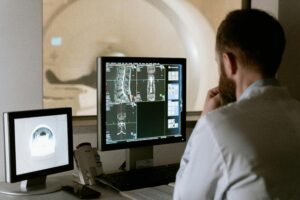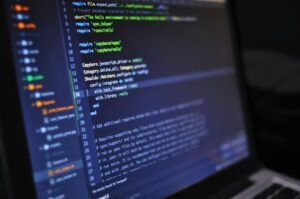AI Vanguard: The Unseen Sentinel Against Future Pandemics

In a world increasingly threatened by the specter of pandemics, Artificial Intelligence (AI) emerges as a beacon of hope. Envision AI not as a futuristic concept but as a current, active defender, meticulously analyzing data to predict and mitigate global health crises before they fully emerge.
AI: Spearheading the Battle Against Epidemics
AI’s role in disease surveillance and forecasting is becoming ever more vital. Organizations like BlueDot, HealthMap, and Metabiota are at the forefront, harnessing AI to scrutinize vast amounts of data for early outbreak signs. For instance, BlueDot’s AI system was among the first to identify the COVID-19 outbreak, showcasing AI’s potential in providing early warnings that can save lives.
From Data to Disease Control: AI’s Expanding Role
The core strength of AI lies in its ability to process and analyze large datasets, discerning patterns and trends beyond human capability. This data, ranging from online news and social media buzz to healthcare reports and airline ticketing information, feeds into AI algorithms. The resulting predictions enable health authorities to deploy targeted interventions, substantially curtailing the spread and severity of infectious diseases.
Innovative AI Endeavors in Global Health
Several pioneering companies and initiatives are redefining the role of AI in health surveillance.
- ProMED utilizes AI to monitor global news for disease outbreak indications. Its algorithms parse through a multitude of news articles, identifying keywords and phrases that hint at emerging outbreaks. This early alert system allows for quicker responses, potentially containing diseases in their infancy.
- BenevolentAI stands out with its AI-driven drug discovery platform. It combs through vast biomedical data, including research papers and clinical trials, to identify potential drug candidates. During the COVID-19 pandemic, BenevolentAI pinpointed existing drugs that could be repurposed for treatment, demonstrating the agility of AI in responding to urgent health needs.
- NVIDIA and DeepMind are revolutionizing genomic research. NVIDIA’s AI accelerates the labor-intensive process of genomic sequencing, making it faster and more accessible. DeepMind’s AI, on the other hand, excels in protein folding analysis, a critical aspect of understanding virus structures and vaccine development.
AI in Action: Real-World Applications
Notable examples of AI in action include Harvard Medical School’s AI model predicting COVID-19 infection rates and Oxford University’s AI-driven tools to analyze COVID-19 trial data.
Harvard’s model uses machine learning algorithms to analyze historical infection data and current trends. By considering factors like population density, healthcare infrastructure, and social behavior, it generates predictions that aid policymakers in allocating resources effectively.
Oxford’s AI-driven tools are crucial for the rapid analysis of vast clinical trial data. These tools help researchers identify trends in treatment efficacy and side effects, accelerating the development and evaluation of potential treatments and vaccines.
Challenges and the Road Ahead
Despite its immense promise, AI’s journey in pandemic management is fraught with challenges such as ethical considerations, data accuracy, and the need for robust international collaboration. Nevertheless, the trajectory is undeniable: AI is becoming an integral part of our global health arsenal.
As the world navigates the uncertainties of future pandemics, AI stands as a vigilant ally. Its role in early detection and management of infectious diseases is not just a triumph of technology but a cornerstone of a safer, more resilient global community.


















